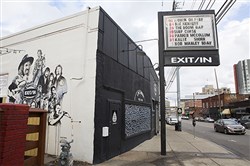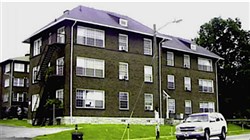VOL. 44 | NO. 5 | Friday, January 31, 2020
Landmarks like Elliston Place imperiled by growth
By Hollie Deese

The Exit/In, a fixture on Elliston Place since 1971, hosted shows by such diverse artists as Etta James, Johnny Cash, Linda Rondstadt, Talking Heads, Billy Joel, Chuck Berry and Steve Martin.
-- Photo By Michelle Morrow |The LedgerA pair of development plans were announced last week that will change the face of one of Nashville’s most storied streets, Elliston Place, known as the Rock Block, long home to the iconic Exit/In and small funky shops and restaurants.
It’s a landmark Nashville neighborhood and business district in danger of losing itself amid rapid growth and development.
JV Hospitality released plans to move forward with its six-story Holiday Inn Express on the site of the 95-year-old trio of Louise Douglas apartment buildings. The apartments are eligible for the National Register of Historic Places.
Elliston Place Soda Shop, a Nashville institution, is moving next door to its current location. Developer Tony Giarratana bought the assets of Elliston Place Soda Shop in November, which operated at 2111 Elliston Place. Giarratana says he now has signed a 25-year lease at 2105 Elliston Place, located just left of the original soda shop, and will be relocating the business there.
“I think we’re looking at a block that has escaped some of the rapid transformation and now is a target,’’ says Elizabeth Elkins, president of Historic Nashville.
Historic Nashville is a nonprofit established in 1968 with the mission to promote and preserve the historic places that make Nashville unique. It has successfully advocated since then for the preservation of the Ryman Auditorium, Union Station and the Hermitage Hotel. The Rock Block – the two-block strip between the Douglas apartments and the Krispy Kreme – is on the organization’s list of the Nashville Nine – the city’s most endangered historic sites.
“These three apartments are some of the few remaining pre-World War II apartment complexes we have in Nashville,” Elkins says. “They’re also in a way a cornerstone to that entire block, the Rock Block, where we have several longtime music venues that are certainly threatened.’’
Elkins has been chair of the Nashville Nine for the past three years and vice president of Historic Nashville for the last two. She has been named incoming president.

The 95-year-old Louise Douglas apartments are set to be razed for a six-story Holiday Inn Express.
-- Photograph ProvidedA Nashville resident for six years, she says the demolition of the apartments is representative of the beginning of a much bigger issue for the block itself. Aside from saving some unique historic buildings, tearing down the apartments would put local music venues such as Exit/In and The End in danger.
JV Hospitality paid $6.5 million for the Douglas property last summer. The plans are for a six-story, 165-room Holiday Inn Express, directly across from the Exit/In, now in its 49th year of operation. The demolishment of the apartments would put that business at risk, says Telisha Cobb, co-owner of the Exit/In with her husband Chris.
“The point of intervention is those historic apartments,” Cobb says. “If they were to be demolished, that would just start to change the whole block.”
JV Hospitality recently applied to the Metro Board of Zoning Appeals for an exemption from parking requirements. Typically, a hotel the size of the plans submitted needs 139 spaces. The group wants to reduce that number to 90. The Board of Zoning Appeals is scheduled to consider JV Hospitality’s parking request at its March 5 meeting.
“Money is obviously at the heart of all of this,” Elkins says. “And it’s extraordinarily complicated to ask people, ‘Hey, no, don’t take that $6.5 million.’ It’s a very messy, complicated issue. And our goal is to do what we can, and bring awareness of it. Talk about it, get people writing their city councilmen to get people to rally together about it. I think this is something that we’ve been keeping a close eye on.”
The two development plans are just the latest step in what Chris Cobb has deemed a “war” that began when JV Hospitality sought to rezone the apartment property to accommodate a 15-story hotel. The Cobbs were able to gather enough community support that the Metro Planning Commission formally disapproved in a unanimous vote.
“We were hoping that the apartments would be bought by a nonprofit or a private entity and turned into legitimate affordable housing,” Cobb adds. “We have done outreach within the community, outreach to the mayor’s office since our last effort, and we haven’t had any luck yet. We hoped that JV Hospitality and the (owners) Patels would consider selling, so that the apartments could be used for preservation and affordable homes.”
Giarratana Restaurant Group’s design for the Elliston Place Soda Shop includes moving the 1930s-era diner to 2105 Ellison, a spot next door that will also include three short-term vacation rentals on the second floor.
“I have a good friend who’s a native, and her dad waited at the soda shop while she was born across the street,” Elkins says. “I think there are many people who have that kind of similar story and emotional attachment to a place like the soda shop. So that can certainly hit you in the heart.”
As someone who moved to Nashville because of the myth of Nashville as a music community, as a small town, and as a place where neighborhoods like Elliston Place that are important to the music industry still exist, Elkins says losing the apartments and switching up the soda shop is about so much more than architecture. It is about identity.
It is also about keeping the area a place where creatives, the driving force behind Nashville’s image, can still afford to live.
“For a long time, artists and creatives could live in town, they could work in town,” Elkins continues. “And we’re replacing this too quickly with very expensive living options, very expensive hotels where we have the highest per night hotel room in the country. So of course that’s going to mean developers are flocking to the city. But I think we’ve got to figure out a way to be smarter about all this rather than just try to get everything up as quickly as possible.”
And the Rock Block is one of those neighborhoods that is integral to the creative and musical identity of Nashville.
“It just threatens the fabric of, I think, how Nashville has identified itself for a long time,” Elkins says. “We obviously want to preserve as many buildings as we can, and we certainly believe in adaptive reuse of buildings and ways to find modern uses for buildings and neighborhoods that are important to us. So we’re sad to see another potential glass tower and hotel go in a neighborhood that’s so key to Nashville’s story.”
It’s the kind of disintegration of culture that could ultimately affect not just locals, but tourists who might begin to visit a barely recognizable city with a proliferation of chains and diminishing local flavor. People want to feel like they are experiencing Nashville, not just any city.
“As we begin to build the cadre of folks that will be engaged in trying to figure this out, we have included planning,” says Butch Spyridon, president and CEO of the Nashville Convention & Visitors Corporation, about helping local businesses from the threat of national chains. “Planning has to be a part of this, and we have to find some ways to protect the character and authenticity.
“I think that’s paramount.”
Cobb and her husband recently reopened the Hurry Back restaurant after that business closed for months after a fire. She says the last few months have given them time to gain clarity about how they want to serve their community, the people who live in Nashville.
“We believe if Nashville is a great place to live, it’ll be a good place to visit,” she explains. “If you’re in a community that is homogenized, where it’s like anywhere USA, where every neighborhood looks the same, you’re going to be less inspired.
“You’re going to be less inspired to connect with your neighbors. You’re going to be less inspired to create art. You’re going to be less inspired to invest and settle down in that area.”
Nashville’s history is a history of people who create, not just consume, Cobb says. But she fears that at the rate Nashville is going, it’s becoming a homogenized consumer culture where everything is identical.
“And it’s really lackluster, and it’s damaging to our quality of life,” she adds. “But it’s not too late. It’s just the right time.”